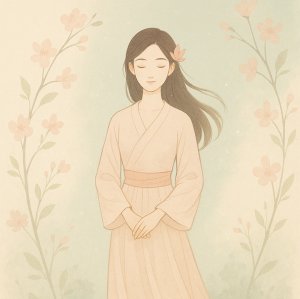The Prisoner of Beauty – A Journey of Healing and Growth
The Prisoner of Beauty may seem like a typical romance or political drama, but for me, it’s more about personal growth and emotional healing. The story revolves around two people with very different childhoods, and how love and emotional safety can transform them.
The male lead (ML) starts his journey consumed by hatred and the scars of a traumatic past. However, his relationship with the female lead (FL), who was raised in a loving and supportive family, becomes the catalyst for his growth. She is kind, grounded, and emotionally intelligent, much like her father. Through her strength and compassion, the ML begins to heal and face his past. Their relationship is one of the most satisfying arcs, not because of romance or drama, but because it feels earned and real.
The contrast between the FL and her female cousin presents an interesting dynamic: some people are driven by a desire to protect others, while others want a simple, peaceful life. The show doesn’t judge these choices but rather explores them in a nuanced way.
The cinematography is beautiful, the direction is sharp, and the acting is stellar. The OST perfectly complements the emotional weight of key moments, while the fight scenes, tragedies, and moments of happiness keep the pacing engaging. One of the show's strongest points is its complexity— everyone’s choices are influenced by their past and circumstances.
The female antagonist, who endured her own traumatic childhood, embarks on a self-destructive path, in stark contrast to the ML’s healing journey. It’s a poignant reminder of how different people cope with pain.
In the end, The Prisoner of Beauty is about breaking generational cycles, finding emotional safety, and becoming a better person—not alone, but through meaningful connections. It’s a show with great rewatch value, and I highly recommend it to anyone who enjoys slow-burn character development and emotional depth.
The male lead (ML) starts his journey consumed by hatred and the scars of a traumatic past. However, his relationship with the female lead (FL), who was raised in a loving and supportive family, becomes the catalyst for his growth. She is kind, grounded, and emotionally intelligent, much like her father. Through her strength and compassion, the ML begins to heal and face his past. Their relationship is one of the most satisfying arcs, not because of romance or drama, but because it feels earned and real.
The contrast between the FL and her female cousin presents an interesting dynamic: some people are driven by a desire to protect others, while others want a simple, peaceful life. The show doesn’t judge these choices but rather explores them in a nuanced way.
The cinematography is beautiful, the direction is sharp, and the acting is stellar. The OST perfectly complements the emotional weight of key moments, while the fight scenes, tragedies, and moments of happiness keep the pacing engaging. One of the show's strongest points is its complexity— everyone’s choices are influenced by their past and circumstances.
The female antagonist, who endured her own traumatic childhood, embarks on a self-destructive path, in stark contrast to the ML’s healing journey. It’s a poignant reminder of how different people cope with pain.
In the end, The Prisoner of Beauty is about breaking generational cycles, finding emotional safety, and becoming a better person—not alone, but through meaningful connections. It’s a show with great rewatch value, and I highly recommend it to anyone who enjoys slow-burn character development and emotional depth.
Was this review helpful to you?


 2
2























